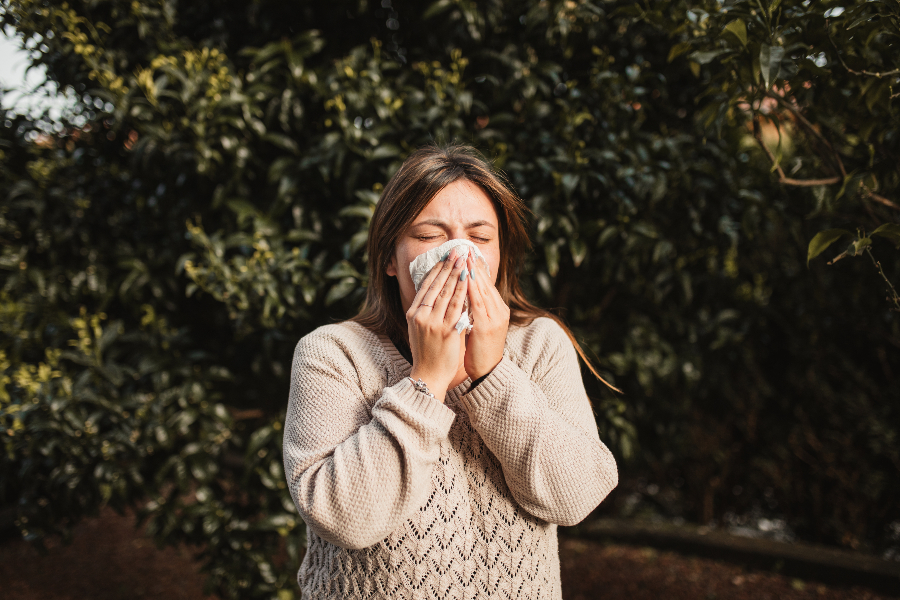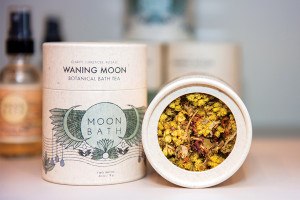Fall Allergies Suck This Year. Here’s Why
Plus, what you can do to find relief, and how to know whether you've got allergies, a cold, the flu, or COVID.

Fall allergies can disrupt even the loveliest of autumns. Here’s how to find relief. / Photograph via Getty Images
Autumn brings many delights: apple picking, visits to the pumpkin patch, spooky season, and vibrant fall foliage. It also ushers in a major dread: seasonal allergies. My itchy nose and watery eyes can attest that this year’s feel especially bad, and I’m confident that all my fellow allergy sufferers will agree when I say relief is much-needed.
That’s why I turned to two local experts — Mary Elizabeth Fontana-Penn, an attending physician in the division of allergy and immunology at Children’s Hospital of Philadelphia (CHOP), and Christopher Scott Little, associate professor of microbiology and immunology at Philadelphia College of Osteopathic Medicine (PCOM) — for insight into all things fall allergies, what to keep in mind when allergy season rolls into cold and flu season, and how we can all optimize our general health so we’re not sick and miserable all winter.
The main causes of fall allergies
There are two camps of allergens: Outdoor and indoor. The former includes pollen, ragweed (a huge culprit!), and mold. Fontana-Penn says outdoor mold primarily exists in soil and is stirred up by raking leaves, planting and harvesting seasonal crops — meaning we’re exposed to high levels of that allergen this time of year. (Hayrides are notorious for built-up mold and residual pollen!). Indoor allergens like dust mites and pet dander become an issue this time of year because the colder weather sees people staying indoors more and closing their windows, incubating people with their triggers.
Why fall allergies feel particularly bad, and why they’ll likely get worse
“This year we had a relatively mild winter, a wet spring, and then warm and wet summer,” Little says. “These are ideal conditions for flora and fungal blooms,” which conytibute to outdoor allergens. He says indoor allergens tend to affect people less during warmer months if we’re spending more time outdoors and in well-ventilated homes, but will impact us to a greater degree during colder months because our time outdoors is more limited.
Unfortunately, fall allergies aren’t going to lessen in years to come. You can thank global warming for that, according to Fontana-Penn. “The increase in byproducts of fossil fuels, particularly carbon dioxide, prevents heat from escaping [from the atmosphere], which results in higher temperatures,” she explains. “Plants are now pollinating and flowering earlier and longer, there’s a larger quantity of plants, and each plant is producing more pollen.” Because it doesn’t look like global warming is stopping anytime soon, anyone who is aggravated by pollen will see their allergies get worse and worse.
How to reduce symptoms and find relief
For those suffering from outdoor allergies, both experts recommend taking precautionary steps like limiting the time you spend outside, keeping your living space’s windows closed, and changing your clothes — or better, showering — when you arrive home from being outdoors (because allergens can cling to you and your clothing!). Fontana-Penn also suggests wearing sunglasses and a hat while outside to keep pollen and ragweed away from your eyes and out of your hair.
If indoor allergens are your kryptonite, consider where they — and you — often rest. Little recommends frequently vacuuming carpets and washing/changing blankets and sheets to minimize common allergens like dust mites and pet dander.
If your allergies are very problematic (i.e. disrupting your ability to perform everyday tasks or causing sinus infection), the above preventative measures aren’t providing relief and/or you simply can’t avoid what’s triggering you, our experts say it’s time to see your doctor to figure out the best path forward, especially via allergy testing. That way, you’ll know what your sensitivity is. A professional might suggest over-the-counter or prescribed medication, which can help reduce symptoms, but not prevent them, Fontana-Penn says. Allergy shots and dissolvable tablets are available and a means to find long-lasting relief, she adds.
Is it allergies, a cold, the flu, or COVID?!
Allergies
Fontana-Penn says if you’re sneezing, have itchy eyes (that’re also watery), nose, throat, ears, and/or have redness in both eyes, but don’t feel sick, you likely have a pollen, weed, or mold allergy. Chronic nasal congestion tends to mean you have chronic indoor allergies. “You never have a fever with allergies, even though the ones that come in the fall are commonly called hay fever,” she says. It’s important to remember that seasonal allergies come on immediately after exposure to the trigger, then seem to cease within hours after the removal of the trigger, Little says.
Cold
“Like allergies, a cold comes on abruptly and tends to not be accompanied by a fever, but the difference is that a cold sees a greater amount of postnasal drip than allergies do and doesn’t last an entire season,” Fontana-Penn says. Your symptoms won’t go away when your trigger is removed — like in the case of allergies — and if a cold gets worse, that might be the sign of a sinus infection.
Flu
The flu typically has sudden onset and is commonly accompanied by a fever — meaning you know it isn’t allergies or a cold — as well as headache, cough, muscle aches, and/or sore throat, Fontana-Penn says. You can get tested and treated for the flu, but you’ll need to get tested shortly after symptoms begin in order for medication to work.
COVID
As for COVID, symptoms vary based on the variant, but there tends to be nasal congestion, runny nose, cough, sore throat, and fatigue.
“Keep in mind that both the flu and SARS-CoV-2 (the virus that causes COVID) establish infections and may seem similar to an allergy only at the very early stages of the infection, but within 24-48 hours, it should be apparent that this is different than an allergic reaction and is continuing to progress in severity, past the point of an allergic reaction,” Little says. The flu and COVID are usually preceded by what’s called a prodromal phase — or, the early stage of infection when a telling symptom first appears — while allergies are not.
Boosting your immune system year-round
Some of the most basic actions can help optimize your immune system. Both experts offer general health recommendations like a balanced, nutrient-dense diet, regular exercise, adequate sleep, staying hydrated, and keeping up-to-date on your vaccinations and boosters. Little adds that if you are sick, stay home if possible to help you recover quicker (rest is important to good health!) and to avoid spreading the infection to others.


